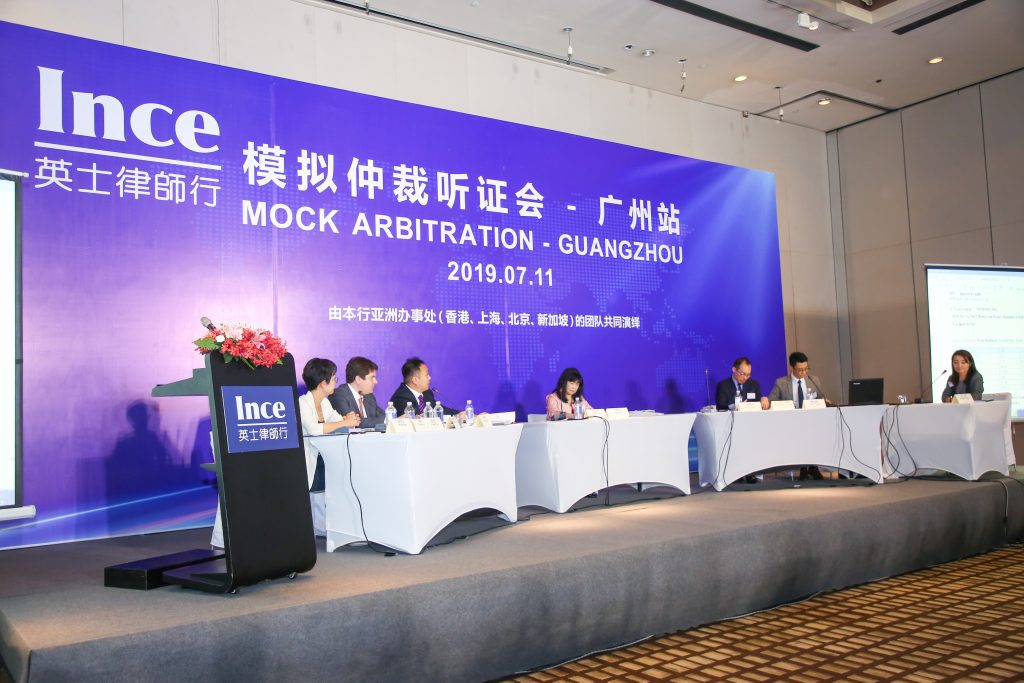Rosita Lau, a leading Hong Kong maritime lawyer at international law firm Ince, is a recipient of multiple awards both for her legal expertise and her role in the development of the maritime industry. Ms Lau was awarded the SAR’s Medal of Honour in July 2021.
She recently took time out to evaluate measures mutually adopted at the local and national level in the field of arbitration that effectively tie the territory's legal and dispute resolution services ever closer to the fortunes of the Greater Bay Area. In doing so she pinpoints a vital gap at state level that, if not filled quickly, could severely limit Hong Kong's aspirations to be the international legal and dispute resolution centre of choice.
What needs to be done
“To really grow maritime arbitration, and enable Hong Kong to be the regional dispute resolution centre, and legal services centre, we must first have disputes referred to Hong Kong, handled in Hong Kong, and decided in Hong Kong. As the GBA Initiative is state policy, the impetus must come from the national Government with its insistence that state-owned companies, semi-state-owned businesses and finally private companies put in their contracts wordings such as, “arbitration disputes arising from and out of the contracts including the interpretation of the contract to be referred to Hong Kong for arbitration in accordance with Hong Kong law”. It is only by doing that that this part of the GBA initiative can become a reality,” insists Ms Lau
Ms Lau is in no mood for compromise:
“I have been advocating for this for more than four years. I have been leading my firm in offering mock arbitrations in the GBA. We have trained many of our friends in the nine cities of the GBA. If not because of the Covid-induced travel ban since January 2020, we would have held many more similar events. Sometimes they ask me to train them up I spend personal time to do so. But if it is set down in the GBA initiative paper that Hong Kong is the regional and international dispute resolution centre, then the authorities must make it happen! Only if the national and local governments fulfil their role, and we as industry players continue to perform our role diligently, will the objective be met.”
 Rosita Lau leads colleagues from Ince Hong Kong Office, Shanghai Representative Office, Beijing Representative Office, and the Singapore Office in a large-scale Mock Arbitration in Guangzhou in July 2019
Rosita Lau leads colleagues from Ince Hong Kong Office, Shanghai Representative Office, Beijing Representative Office, and the Singapore Office in a large-scale Mock Arbitration in Guangzhou in July 2019
When discussing the Greater Bay Area Initiative, the Chinese Government's scheme to link the cities of Hong Kong, Macau, Guangzhou, Shenzhen, Zhuhai, Foshan, Zhongshan, Dongguan, Huizhou, Jiangmen and Zhaoqing into an integrated economic and business hub, Rosita Lau recommends first adopting a historical perspective. By doing so one gains a deeper understanding of the origins of the GBA concept, how Hong Kong can best integrate with the GBA, what it can contribute, and what it stands to gain from doing so.
The GBA initiative is not a novel concept. Rather it is the result of earlier developments in China aimed at opening the country to the outside world that began to emerge following the downfall of the Gang of Four in October 1976, and the taking over of the reins of power in 1978 by the reforming leader Deng Xiaoping and the establishment of Special Economic Zones in the southeastern part of the country. The first cities to benefit were in the southern province of Guangdong in 1979, such as Shenzhen, Shekou, and Zhuhai. At that time a number Hong industrialists spotted the opportunity and contributed hugely to the development of the SEZs by transferring their factories over the border and employing a large local workforce.
Fast-forward to 2017 and the inception of the GBA Initiative – a regional initiative awarded national status – arrives within a region that is very different to what it was more than 40 years ago. Today the GBA is a mature, cohesive economy dominated by industry on the mainland and Hong Kong as a source of legal and financial services.
A leading aim of the GBA initiative is the increasing integration of Hong Kong into the overall national development of mainland China. Some observers have interpreted this as meaning subsuming Hong Kong's economy into that of its much larger partner across the border. Ms Lau, on the other hand, insists that when it comes to Hong Kong's legal and dispute resolution services there are inevitable limits.
“In the case of legal matters, Hong Kong is undoubtedly at the forefront, and this should be recognised. When considering the Hong Kong SAR, Macau SAR, and the nine cities of the Guangdong province, I cannot think of any better place to lead the region in legal and dispute resolution services. This is because Hong Kong is the only component of the GBA which is international as far as the practicing of law is concerned, as far as the legal system is concerned, and as far as the requisite hardware and software is concerned.
“I would go further and suggest that among all the cities in China as of today – there is no better city than Hong Kong to represent China to the outside world. When it comes to law and legal services, in the context of maritime services, it is without doubt second-to-none as an international maritime centre in its provision of legal services,” Ms Lau insists.
“Hong Kong remains so prominent from an international legal perspective because it has the rule of law and, more importantly Hong Kong remains a common law jurisdiction where English law, the dominant law in the resolution of maritime disputes, is still practised,” she adds.
Hong Kong has a further advantage in the quality of its practicing maritime lawyers and arbitrators – their exposure to the cultures of East and West, their language skills, and international vision. In this respect one needs look no further than Ms Lau as a prime example. Educated in England and Hong Kong, Ms Lau first qualified in England.
Subsequently she was admitted in Hong Kong, Singapore, and Australia ACT. She had worked in London before practising in Hong Kong, where for many years she headed the China Desk of the firm and set up its Shanghai representative office in record time in 2000, a year ahead of China joining the WTO, hence capturing many opportunities during the early stages of China's membership.
But is the uniqueness of Hong Kong in relation to the rest of China likely to be problematic in terms of its integration into the GBA?
“So far as inroads into the GBA are concerned, I think there will be some initial difficulties that one must be cognizant of from the get-go,” says Ms Lau.
“Chinese law is very different to English law and Hong Kong law. One cannot deny that Shipping law is international and of the GBA components only Hong Kong practices international law at large. This is not a criticism of Chinese law. I have huge respect for the progress made over the last 25 years since the Chinese Maritime Code came into force in 1993. Since then, the authorities have been working conscientiously to improve it.
“But still the laws remain quite different to those in Hong Kong. Therefore, as a starting point, and to speed up development, Hong Kong must be allowed and given all the opportunities required to lead the development of the region in legal services and dispute resolution,” she forcefully asserts.
It is not surprising therefore that one of the most important roles assigned to Hong Kong by Beijing is that of regional and international legal and dispute resolution centre. Other roles endowed by Beijing to Hong Kong are to continue to be an international maritime centre, international finance centre, and finally, international trading centre. As trade, finance and maritime are all inextricably linked it makes sense that they share a common venue.
Recent developments in arbitration
Ms Lau applauds the recent agreement made between Hong Kong and the national Government pertaining to the recognition by China of arbitral awards made in Hong Kong. However, Ms Lau has been openly critical of the present arrangement whereby this recognition is confined geographically to Guangdong and limited in its ambit to economic and financial contracts only. According to Ms Lau the arrangement should extend to all civil proceeding judgements. She is hopeful however, that this objective could be achieved by the end of 2022.
In October 2019, the Hong Kong Judiciary and the Secretary for Justice announced an arrangement concerning mutual assistance in court-ordered interim measures in aid of arbitral proceedings by the courts of the mainland and the HKSAR. Thus far this arrangement offers a unique advantage to parties conducting arbitrations through recognized arbitration institutions in Hong Kong. With this development a party to a Hong Kong arbitration has the right to apply to the Chinese court to give interim measures such as preservation of assets and or evidence. It is also possible to apply for an interim injunction.
Finally, in 2020 China's State Council implemented pilot measures for Hong Kong and Macao legal practitioners to obtain Mainland practice qualifications and to practise as lawyers in the nine Pearl River Delta municipalities in the Greater Bay Area. However, where maritime law is involved, Ms Lau perceives this development as a distraction given the international nature of maritime law. Instead she suggests a better, quicker, and more open minded approach would be to allow leading Hong Kong maritime law firms to establish a presence within the GBA where they could practise maritime law straightaway.
In the international arena, Hong Kong's inclusion in the BIMCO Law and Arbitration Clause 2020, as one of four recognised arbitration venues, was a well-deserved recognition that reflects Hong Kong's reputation as a reliable, efficient, expeditious and cost-effective venue for the resolution of maritime disputes. Ms Lau recalls the meeting with BIMCO's representatives, and negotiating with them on the advantages that BIMCO would have if Hong Kong were added as one of the arbitration venues in BIMCO's standard contracts. She describes the BIMCO inclusion as extremely valuable to Hong Kong's reputation as a desirable venue for maritime arbitration.
Hong Kong was already accepted as an important venue for maritime arbitration ahead of the BIMCO decision, with a respectable number of maritime arbitration cases being resolved in the territory each year. In the wake of the global pandemic, and more recently the Russia-Ukraine conflict, Ms Lau confidently predicts there will be a surge in the number of disputes that could be handled in Hong Kong. But in the current circumstances she fears an omission at state level could limit Hong Kong's true potential.
Source:
Hong Kong Maritime Hub
The opinions expressed herein are the author's and not necessarily those of The Xinde Marine News.
Please Contact Us at:
media@xindemarine.com


 Rosita Lau leads colleagues from Ince Hong Kong Office, Shanghai Representative Office, Beijing Representative Office, and the Singapore Office in a large-scale Mock Arbitration in Guangzhou in July 2019
Rosita Lau leads colleagues from Ince Hong Kong Office, Shanghai Representative Office, Beijing Representative Office, and the Singapore Office in a large-scale Mock Arbitration in Guangzhou in July 2019 Ningbo Containerized Freight Index Weekly Commentar
Ningbo Containerized Freight Index Weekly Commentar  Ningbo Containerized Freight Index Weekly Commentar
Ningbo Containerized Freight Index Weekly Commentar  Ningbo Containerized Freight Index Weekly Commentar
Ningbo Containerized Freight Index Weekly Commentar  BIMCO Shipping Number of the Week: Bulker newbuildi
BIMCO Shipping Number of the Week: Bulker newbuildi  Ningbo Containerized Freight Index Weekly Commentar
Ningbo Containerized Freight Index Weekly Commentar  Ningbo Containerized Freight Index Weekly Commentar
Ningbo Containerized Freight Index Weekly Commentar